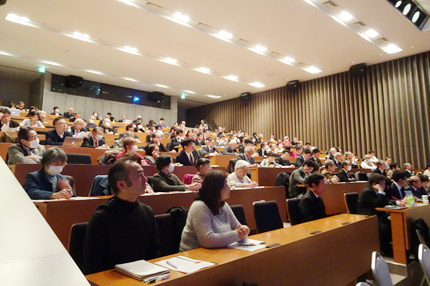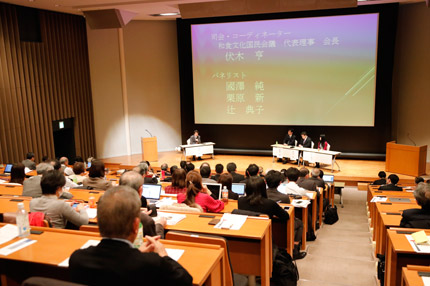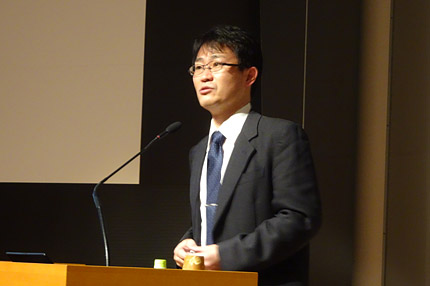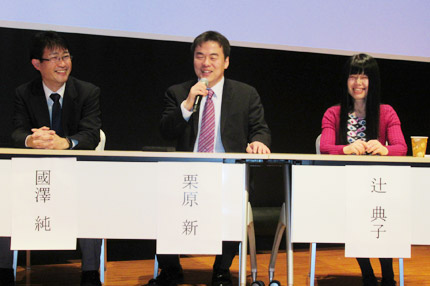HOME > Holding report of recent event > The Canon Foundation holds its first symposium for outside participants on the theme of "intestinal bacteria."
The Canon Foundation holds its first symposium for outside participants on the theme of "intestinal bacteria."

On Tuesday, February 6, 2018, the Canon Foundation and its cosponsor, Washoku Japan (the General Incorporated Association of Japanese Food Culture), held a symposium on the theme "Washoku and Health: New Developments in Research on Food and Intestinal Bacteria." The event was held at Akiba Hall in Fujisoft Akiba Plaza in Chiyoda-ku, Tokyo.
Every year, the "Pursuit of Ideals" grant program of the Canon Foundation selects research subjects on a particular theme. From 2009 to 2013, the Canon Foundation funded research on the theme of "the sea"; since 2014, the Foundation has been funding research focused on "food."
The research on food and intestinal bacteria funded by the Canon Foundation has helped to provide scientific backing for traditional Japanese food culture known as "Washoku culture," an issue promoted by Washoku Japan, the cosponsor of this symposium.
This is the first symposium by the Canon Foundation that has welcomed participants from outside the Foundation.
The symposium proved to be a great success. With roughly 200 in attendance, participation greatly exceeded expectations, resulting in a need to procure additional seating.
The symposium opened with an address by Ayako Ehara, Chair of the Research and Study Group of Washoku Japan. Later, Satoshi Kondo, former Chief Secretary of the Canon Foundation, provided an outline of the Canon Foundation and introduced food-related activities.
Thereafter, three researchers funded by the Canon Foundation introduced their latest research findings. They took a scientific approach to explaining how food and intestinal bacteria can influence human health.
Jun Kunisawa of the National Institutes of Biomedical Innovation, Health and Nutrition used the example of everyday cooking oil to highlight the health improvements that can accrue from the consumption of healthful foods and the potential benefits for intestinal bacterial. His lecture was titled "Development of an Intestinal Environment from Foods and Intestinal Bacteria and the Challenges to Promoting a Societal Commitment to Health and Longevity."
Shin Kurihara of Ishikawa Prefectural University presented a study clarifying the role of genetics on intestinal bacterial flora in the effort to improve the intestinal environment. The theme of his presentation was "Improving the Intestinal Environment using Genetic Control of Metabolite Production by Intestinal Bacterial Flora."
Noriko Tsuji of the National Institute of Advanced Industrial Science and Technology then discussed the relationship between improved health and the power of self-healing through a strengthened immune response. She also discussed fermented foods containing high quantities of lactic acid bacteria that can live in the small intestine. Her talk was entitled "Fermented Foods Beneficial to the Small Intestine and Overall Health."
The panel discussion that took place before the conclusion of the symposium included the chairman/coordinator, Toru Fushiki, Representative Director of Washoku Japan, as well as the three panelists who delivered presentations. By contributing their own knowledge and experience, the participants ensured a productive and friendly discussion.
The Canon Foundation is committed to inviting funded researchers to additional periodic symposiums for outside participants in the future.















